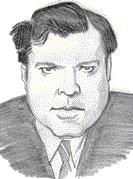'I Started at the Top and Worked Down'

"I started at the top and worked down." -- Orson Welles.
It is possible that Orson Welles' childhood gave him the tools to insinuate his way into the life of a raging mendicant moine terrible. Born on this day in 1915 in Kenosha, Wisconsin to affluent parents who encouraged his artistic interests, Welles was pegged as a prodigy early -- reading Shakespeare on his own at three; writing, designing and performing his own plays at four; playing violin and piano, drawing and performing magic at 8. While still a teenager at school, he co-authored and published a popular textbook, Everybody's Shakespeare.
By the time he was 14, Welles' parents were both dead and he was adopted by a family friend. At 16 he was supposed to enter Harvard, but instead he followed his heart to Ireland to paint, and he soon joined Micheal MacLiammoir's Gate Theater in Dublin. After a hiatus (bullfighting in Spain, sketching in Morocco) he returned to the U.S. and was hired by Katherine Cornell (on the recommendation of Thornton Wilder) and performed in her national tours of Romeo and Juliet and Candida.
Next he turned to directing, mounting dazzlingly original productions of Macbeth (1935, for the Federal WPA; set in the Caribbean with an all-African cast) and Julius Caesar (1937; in modern dress, drawing explicit parallels with contemporary European fascism), as well as the controversial, renegade premiere of Marc Blitzstein's socialist opera The Cradle Will Rock (1937).
With John Houseman he established the Mercury Theater, producing not only stage works but radio shows. While he earned his bread using his rich, deep voice as "Lamont Cranston" on radio's The Shadow, with the Mercury group he wrote, produced and acted in inventive radio dramas, including the notorious adaptation of H.G. Wells' War of the Worlds (October 30, 1938) -- a Halloween prank about Martian invaders which was so realistic that thousands of radio listeners became panic-stricken.
At the end of the 1930s, Welles brought the Mercury group (including Houseman, composer Bernard Herrmann and actor Joseph Cotten) to Hollywood, where eventually he began work on Citizen Kane (1941) for RKO. Considered by many critics to be the greatest American sound film ever made, Kane (which was co-written by Herman Mankiewicz) was full of surprising cinematic wizardry atypical of Hollywood productions, including deep-focus photography by Gregg Toland, shocking jump-cuts and an unprecedentedly complex soundtrack. The film was loosely modeled on the life of newspaper tycoon William Randolph Hearst, and made Hearst look, by implication, like a brute and a pathetic old fool; Hearst threw his weight against it, and the film did not do well at the box office.
Welles' second film for RKO, The Magnificent Ambersons (1942, based on Booth Tarkington's novel) was re-cut by the studio and flopped, and soon Welles was out on his own. After a brief marriage to Rita Hayworth (his second), he spent much of his time in Europe, acting in occasional films (notably as "Harry Lime" in Carol Reed's The Third Man, 1949) and occasionally finding backing to direct his own films. His Othello (1952) won the Grand Prix at the Cannes Film Festival; Touch of Evil (1958) and Chimes at Midnight (1966) were also critically-acclaimed.
Late in life he settled gracefully into the role of the avuncular talk show guest and TV pitchman while he waited for another chance to make a film of his own. He was a boldly self-confident, larger-than-life character, bursting with promise unfulfilled, yet never idle -- just misunderstood by those who should have provided him with his tools.
Labels: Classic Cinema, Shakespeare, Theater





3 Comments:
While citizen Kane is widely acclaimed, his best film imho is Flastaff, a sort of medley of fragments of H IV and H V about the relationship between Hal and Falstaff. It's very hard to find. None of the several online filmographies of OW which I have consulted even mention it.
'Falstaff' is the film I refer to as 'Chimes at Midnight,' and yes, it is quite good.
Not just good, great.
I have only seen it complete once on British Television and fell in love with it.
Tried to get a copy ever since and never come across it.
Orsen extracts the Falstaff and gives us a stunning performance - possibly his greatest - although i still think Citizen Kane is a better film (if with lesser material).
(Can't dig a connection out of this one.)
Post a Comment
Subscribe to Post Comments [Atom]
<< Home